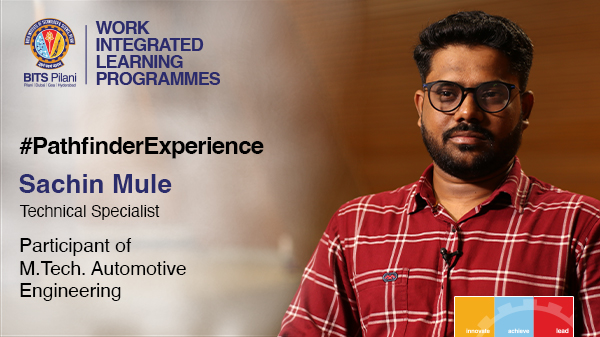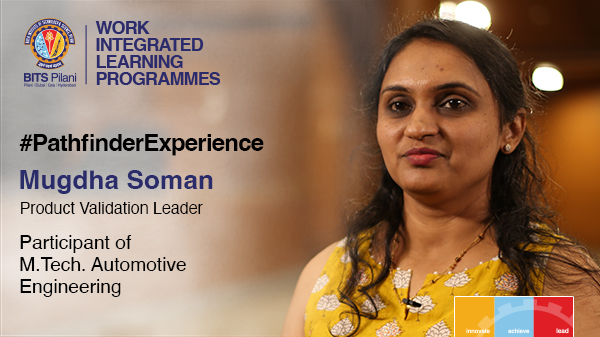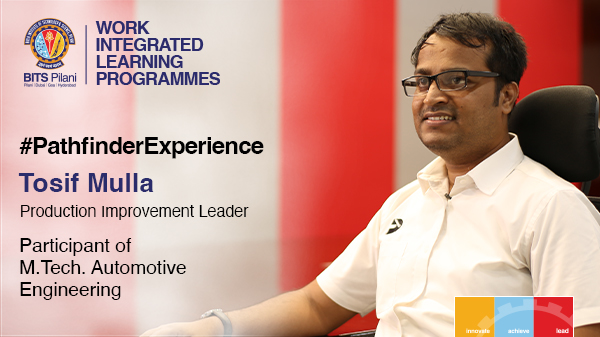Rewrite the future of the Automotive industry
The Automobile industry is at a point of inflection and is witnessing a dramatic transformation in dimensions such as auto-shift to driver-assisted and autonomous driving, IC engines to electric engines, infotainment to connected automobiles, and passive safety to active safety. All stakeholders in the industry need to upgrade themselves to be a part of this change to innovate, achieve and lead the future of the automotive industry.
M.Tech. Automotive Engineering is a four-semester Work Integrated Learning Programme designed to help engineering professionals build skills required to remain competitive in the rapidly evolving workplace and enable rapid career progression in the automotive industry.
Programme Highlights
- Industry-relevant curriculum, delivered online or on-site lectures.
- Special focus on Engine technologies, Electric mobility, Automotive control systems, and Automotive systems engineering.
- Futuristic curriculum developed by academic experts in consultation with leading automotive organisations.
- A two-day intensive boot camp session to learn and apply contemporary topics such as ‘Design Thinking, ADAS, Engine Calibration and Automotive Systems Engineering’.
- An annual conclave to network, learn and share best practices with the leading industry professionals and academicians.
- The education delivery methodology is a blend of classroom and experiential learning. Emphasis on Experiential learning through an Integrated Automotive Engineering lab with remote access capabilities, in addition to assignments, case studies and other work-integrated activities.
- The Dissertation (Project Work) in the final semester enables students to apply concepts and techniques learnt during the programme.
- The programme uses a Continuous Evaluation System that assesses the learners over convenient and regular intervals. Such a system provides timely and frequent feedback and helps busy working professionals stay on course with the programme.
- Participants who successfully complete the programme will become members of an elite & global community of BITS Pilani Alumni.
Programme Curriculum
Participants need to take at least 12 courses towards coursework, and complete one Project/ Dissertation. The coursework requirement for the programme would consist of a set of core courses and electives. Core courses are compulsory for all participants, while electives can be chosen based on individual learning preferences.
The programme offers a degree of customisation to address the specific L&D needs of your organisations.
- Mechatronics
- Advances in IC Engines
- Advances in Vehicle Body Structures
- Vehicle Dynamics
- Elective 1
- Elective 2
- Elective 3
- Elective 4
- Automotive Systems Engineering
- Elective 5
- Elective 6
- Elective 7
Dissertation
- Automotive Control Systems
- Embedded Systems Design
- Electric and Hybrid Vehicles
- Automotive Security
- Advanced Vehicle Acoustics
- Product Design
- Advances in Materials, Composites & Plastics
- Advanced Engine Technology
- Durability, Crash & Safety Engineering
- Advanced Driver Assistance Systems
- Connected Cars
- Advanced Automotive Systems
- Advanced Engineering Mathematics
- Fracture Mechanics
- Computer Aided Design
Learning Methodology
LECTURES DELIVERED ONLINE AND ONSITE
Lectures are delivered by BITS Pilani faculty members through live via online classes, or at the organisation's premises, and are designed to offer similar levels of interactivity as regular classrooms at the BITS Pilani campus.
DIGITAL LEARNING
Learners can access engaging learning material which includes recorded lectures from BITS Pilani faculty members, course handouts and recorded lab content where applicable.
CONTINUOUS ASSESSMENT
Continuous Assessment includes graded Assignments/ Quizzes, Mid-semester exam, and Comprehensive Exam.
EXPERIENTIAL LEARNING
<The program emphasises on application of engineering and science learnt in the class through virtual and remote labs:
Learners perform a variety of experiments using industry scale simulation software in a virtual lab such as Ricardo, Matlab Simulink etc. Controlled experiments are performed in Automotive Engineering Remote Labs, accessing physical lab equipment using remote control systems.
CASE STUDIES AND ASSIGNMENTS
Carefully chosen real-world cases & assignments are both discussed and used as problem-solving exercises during the programme.
DISSERTATION/ PROJECT WORK
The fourth semester offers an opportunity for learners to apply their knowledge gained during the programme to a real-world like complex project. The learner is expected to demonstrate understanding of vital principles learnt across semesters and their ability to successfully apply these concepts.
Online Labs & Remote Labs
VIRTUAL LAB
The Virtual Lab is a cloud based simulation space, where participants can design, develop and test solutions for industry scale problems. The lab hosts a range of popular software tools that can simulate the complete spectrum of engineering processes to the accuracy and precision of real-life. The lab is open 24x7, 365 days with a live support.
Participants of M.Tech. Automotive Engineering can access the following Virtual Labs:
Model Based System Design Lab
Model-Based Design (MBD) is a mathematical and visual method of addressing problems associated with designing complex control, signal processing and communication systems economically. Software includes modellica based libraries from different domains such as, power train, IC engines, drives, transmission, battery, hydraulics, pneumatics, electrical and so on. Participants can perform experiments such as Spring mass damping model: modelling and validation, Quarter, half and full car suspension modelling
Electric & Hybrid Vehicles Virtual Lab
This lab uses Ricardo Ignite and Matlab Simulink software tools. Ignite has built-in powertrain library from provides complete vehicle system modelling of conventional, hybrid, electric and novel vehicle architectures. This lab also delivers adjustable component fidelity for vehicle modelling – from initial concept to detailed powertrain integration. Participants can perform experiments such as Vehicle Modelling for IC engines, Vehicle Modelling of pure electric vehicle for MPGe.
ANSYS Virtual Lab
Finite Element technique allows to analyse more complex design geometry with higher accuracy to understand the physical behaviours of a complex object. ANSYS Virtual Lab deals with various numerical analysis and predicts the structural and thermal behaviour of components to check and validate its design more accurately and economically. Participants can perform experiments such as Evaluating static and dynamic performance of various design under structural and thermal loading.
IC-Engines Virtual Lab
This lab enables the users to visualize and model an IC engine and its allied system as a 1D model (Mathematical Model) by using predefined elements such as cylinders, ducts, valves, turbochargers and so on. Virtual tool lets the engineers concentrate more on system optimization by varying different design parameters such as cams, injector location, fuel types, calibration parameters and so on. Participants can perform experiments such as Gasoline, multi cylinder diesel, common rail and naturally aspirated gasoline engine model engine models
Virtual Lab using Matlab
MATLAB (matrix laboratory) is a multi-paradigm numerical computing environment and proprietary programming language. Matlab is used for computer programming, mathematical modelling such as geometry, dynamics & robotics, and MIL simulations. Participants can perform experiments such as Computer programming experiments, Design the points, curves and surfaces and validate mathematically using curve fitting toolbox.
Remote Lab
Through the Remote lab, participants can perform controlled experiments from anywhere in the world. The IoT enabled lab equipments and the integrated remote access network makes this possible. The lab is open 24x7, 365 days. Remote Lab is one more attempt by the work integrated learning programs division of BITS Pilani to bring the campus learning experience to the working professionals complementing their work-life-learning balance. Participants of M.Tech. Automotive Engineering can access the following Remote Labs:
Steer-by-wire Test rig
Steer-by-wire test rig comprises of a Master and Slave steering wheel setup that is controlled using MATLAB-Simulink environment via CAN communication. The actuators are controlled by Arduino microcontrollers in a closed-loop system based on sensor measurements. Participants can perform experiments such as Develop a control strategy for steering for autonomous driving taking inputs from CAN messages, Implement a PI controller to minimise the error and achieve target using a closed loop system.
Brake-by-wire Test rig
Brake-by-wire test rig comprises of a single wheel controlled by a motor to simulate the braking system in hard braking conditions. It comprises of a Master and Slave steering wheel setup that is controlled using MATLAB-Simulink environment via CAN communication. Participants can perform experiments such as Develop a control strategy for applying brakes using desired slip ratio for different road-tyre slip conditions.
Hardware-in-loop Rig
Hardware-in-loop test rig comprises of a Data Acquisition for I/O signal communication to enable testing of real-time hardware components integrated with the associated plant model running in a virtual real-time MATLAB environment. Participants can perform experiments such as Tune the automotive engine controller using the mapped engine model, Design and develop a controller for the EV & HEV.
Emission analysis using AVL DiTEST
AVL DiTEST is an equipment to handle emission measurement and diagnostic codes from OBD – II Protocol. It can measure exhaust gaseous emission and smoke intensity of vehicles. Participants can perform experiments such as Electronic Control Unit diagnostics, Exhaust emission analysis/official emission measurements.
Electronic Throttle Body Test Rig
This equipment explains the strategy to get the desired throttle valve position and valve opening rate in modern electronic throttle body. The control strategy is made in Matlab Simulink with respective algorithms. Participants can perform experiments such as Building electronic throttle body control system.
Automatic Gear Box Test Rig
This test rig focuses on building a complex strategy that can operate a gearbox under any conditions such as steep gradients, excess speed & load and so on. Participants can perform experiments such as Develop control strategies for automatic gear box, Develop control strategy for Uphill mode and several fail safe modes in Matlab Simulink.
Chassis Dynamometer
Chassis dynamometer creates virtual road condition by running the vehicle on heavy inertial rollers. Significant real time data such as vehicle power and torque will be recorded against testing procedures. Participants can perform experiments such as Tabulating real time power and torque data recorded at different vehicle speed.
Petrol Engine Test Rig with Eddy Current Dynamometer
Eddy current dynamometer is connected to the four cylinder petrol engine which can be calibrated with a standalone Electronic Control Unit (ECU). Participants can perform experiments such as Tabulating real time engine data recorded at different loading conditions.
Experiments with ACS Lab
The ACS lab aims at providing a first-hand experience of vehicle hacking to the students of Automotive Engineering & Electronics. The lab uses both virtual tools and hardware. Students use them to understand the CAN (Controller Area Network) communication, data logging and penetration testing. Participants can perform experiments such as V-Can: Sniff CAN communication, Identify CAN ID for various functions, hack the virtual system.
Eligibility Criteria
Minimum eligibility to apply: To apply, candidates must be employed professionals holding BE/ B.Tech. in relevant disciplines with at least 60% aggregate marks, and minimum one year of working experience after the completion of the degree in the relevant domain.
The programme is designed for highly driven and ambitious professionals who wish to prepare themselves for the emerging technologies in Automotive Engineering, and acquire skills in core technical areas such as IC Engines, Electric Mobility, ADAS to lead research and development projects in technology-driven automotive engineering organisations.

.png)



.png)
.png)
.png)
.png)
.png)